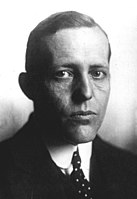 Global Information
Global InformationFlensburg Government information
Cabinet of Lutz Graf Schwerin von Krosigk The Flensburg Government | |
|---|---|
3rd Cabinet of Nazi Germany | |
| 2 May 1945 – 23 May 1945 (de jure until 5 June 1945) | |
 | |
| Date formed | 2 May 1945 |
| Date dissolved | 23 May 1945[a] (de facto) 5 June 1945 (de jure) |
| People and organisations | |
| Head of state | Karl Dönitz |
| Head of government | Lutz Graf Schwerin von Krosigk |
| No. of ministers | 10 |
| Member party | Nazi Party |
| History | |
| Predecessor | Goebbels cabinet |
| Successor | Allied Control Council First Adenauer cabinet (from 20 September 1949) Council of Ministers of East Germany (from November 1950) |
The Flensburg Government (German: Flensburger Regierung), also known as the Flensburg Cabinet (Flensburger Kabinett), the Dönitz Government (Regierung Dönitz), or the Schwerin von Krosigk Cabinet (Kabinett Schwerin von Krosigk), was the rump government of Nazi Germany during a period of three weeks around the end of World War II in Europe. The government was formed following the suicide of Adolf Hitler on 30 April 1945 during the Battle of Berlin. It was headed by Grand Admiral Karl Dönitz as Reichspräsident and Lutz Graf Schwerin von Krosigk as the Leading Minister. The administration was referred to as the "Flensburg Government" because Dönitz's command had relocated to Flensburg in northern Germany near the Danish border on 3 May 1945.[1] The sports school at the Mürwik naval academy was used as the government headquarters.
At the time of its formation, forces loyal to the Nazi regime still held control of most of Austria and the Sudetenland, which had been annexed by Germany in 1938. They also still controlled most of the Protectorate of Bohemia and Moravia which had been partially annexed in 1939 when the remainder of Czechoslovakia was occupied, although after Hitler's death those Czech lands still occupied were effectively controlled by the SS with little meaningful oversight from Flensburg. Furthermore, the German military continued to occupy other non-German-speaking territories in disparate and isolated locations across Europe, such as Denmark, Norway, the Atlantic pockets in France and the British Channel Islands. However, in addition to losing most of its wartime conquests by this point, German forces had already been driven out of the vast majority of Germany's post-Anschluss territory, in addition to Luxembourg as well as the Polish and French territories Germany had either annexed or placed under direct German administration in the early stages of the war.

Due to the rapid Allied advance, the Flensburg government's nominal civil jurisdiction at its formation was essentially limited to those parts of Austria and the Sudetenland its forces still controlled as well as a narrow wedge of German territory running from the pre-1938 Austrian and Czechoslovak borders through Berlin to the Danish border. From 25 April 1945, these lands were cut in two by the American advance to join with Soviet forces at Torgau on the Elbe.
Upon the capitulation of all German forces on 8 May, the administration headed by Dönitz and Krosigk ceased to meaningfully function as a national government. For about two weeks after the surrender, it was for most practical purposes ignored by the Western Allies as well as neutral states and Japan. In the absence of direct military intervention within Flensburg itself, the ministry there continued to regularly meet and conduct what business it could. Finally, due to factors including pressure from the Soviet Union, on 23 May British troops arrested the entire cabinet as prisoners of war and thus effectively dissolved the last surviving legal remnants of the Nazi regime. This dissolution was formalised by the four Allied Powers on 5 June 1945, who at that time formed the Allied Control Council to co-ordinate the civil administration of Allied-occupied Germany.[2]
Cite error: There are <ref group=lower-alpha> tags or {{efn}} templates on this page, but the references will not show without a {{reflist|group=lower-alpha}} template or {{notelist}} template (see the help page).
- ^ Jones 2015, p. 88.
- ^ Jones 2015, p. 323.